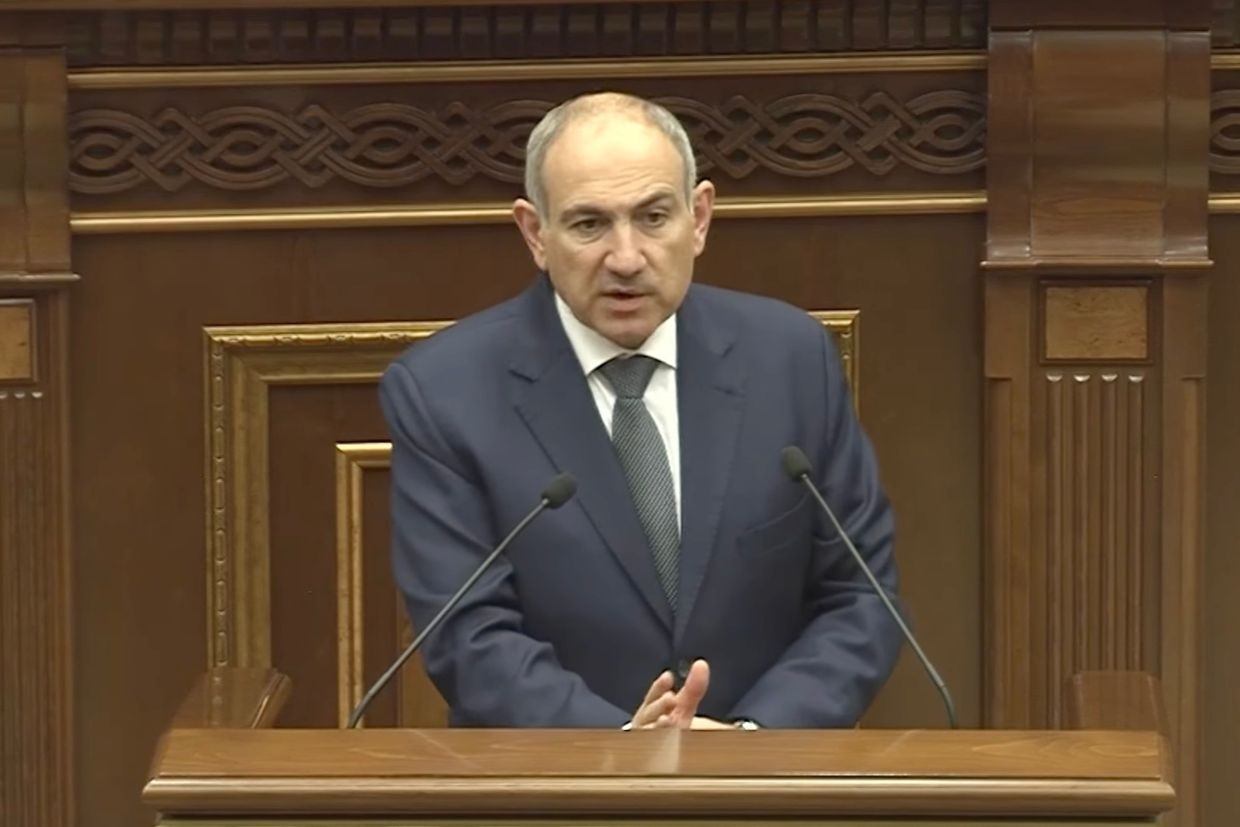Pashinyan castigates Karabakh movement and political opponents in emotional parliamentary outburst

During a parliamentary Q&A session on Wednesday, Armenian Prime Minister Nikol Pashinyan claimed that the ‘Karabakh movement’ should not continue, emphasising that it had contributed to ‘the failure of Armenia’s statehood’. Pashinyan also attacked his political opponents, threatening to ‘crush’ them.
The Karabakh movement was a mass national movement which called on the Soviet government to transfer the majority ethnic Armenian NKAO from Soviet Azerbaijan to Soviet Armenia.
‘I would not be honest if I did not say from this podium that we should not continue the Karabakh movement’, Pashinyan said on Wednesday, adding that ‘if the people of Armenia disagree with this statement of mine, I will not be the Prime Minister of Armenia’.
Pashinyan also emphasised that the current approach to secure the release of Armenian prisoners held in Azerbaijan was the most ‘effective option’.
‘Today, we continue to use the tools that we have used in the past, and must use in the future’, Pashinyan said, adding that the government’s understanding of regional issues was ‘comprehensive and integrated’.
Azerbaijan has acknowledged it holds 23 Armenian prisoners in custody, including former Nagorno-Karabakh state officials. Earlier in March, Armenia claimed Armenian prisoners in Azerbaijan had been subjected to torture, citing evidence observed in photos published by Azerbaijan.
Pashinyan’s comments came just weeks after Armenia and Azerbaijan announced they had agreed on the terms of a historic peace deal, after over three decades of bitter conflict.
However, shortly following the announcement, Azerbaijan announced two ‘pre-conditions’ for Armenia before the agreement could actually be signed — namely that changes to the Armenian Constitution, which Baku says contains claims to Azerbaijani territory, be made and the dissolution of the OSCE Minsk Group, the body responsible for facilitating negotiations over the past few decades.
In addition, from 16 March to 21 March, Azerbaijan accused Armenia of violating the ceasefire at least 13 times, which Armenia repeatedly denied, while Azerbaijani pro-government media has continued to claim Armenia is preparing for war.
While Armenia had already been willing to grant significant concessions, many of which were made before the peace deal was agreed upon, some view the new Azerbaijani preconditions and increasing military rhetoric to be increasing pressure on Pashinyan and the Armenian government for additional compromises on the Armenian side.

Pashinyan threatens to ‘crush’ his political opponents
During Wednesday’s Q&A session, Pashinyan also took aim at his political opponents, responding to accusations that he was capitulating to Azerbaijani demands.
Earlier in March, following Azerbaijan’s announcement of preconditions and increased militaristic rhetoric, Pashinyan announced that his government would ‘initiate discussion’ of the dissolution of OSCE Minsk Group. Similarly, Armenia’s Deputy Foreign Minister Paruyr Hovhannisyan said that if the peace treaty with Azerbaijan is signed and ratified, they could discuss a new mandate for the EU mission in Armenia (EUMA), which has historically been a sticking point for Azerbaijan.
Notably, on Wednesday, Pashinyan lashed out at former Presidents Serzh Sargsyan, Levon Ter-Petrosyan, and Robert Kocharyan, threatening to ‘throw [them] against the wall’ and ‘trample [them] underfoot’ if they did not stop blaming him for the fall of Nagorno-Karabakh.
He also accused them of wrapping ‘their capitulation around my neck’ for rejecting a televised debate with him on the issue.
Pashinyan proposed such a debate in December 2024, feeling that he had been particularly singled out for criticism, despite the fact that the negotiation process has lasted for decades.
When opposition politicians took umbrage at Pashinyan’s statements, Pashinyan castigated the MPs in an emotional outburst.
‘Hey you, if there’s nothing to debate, sit down and shut up. If we’re debating, then let’s talk. I’m telling you, I won’t argue with you — I will crush you. They’ll scrape off the remains of your political corpses. This applies to all three of you. Stop playing with my nerves. I will trample you, not debate with you’, Pashinyan said.
In response to Pashinyan’s claims, Sargasyan’s office stated that ‘among all the assessments of his [Pashinyan’s] disastrous governance, the one that unsettles him to the point of becoming a national security threat is being called a capitulant’.
‘Having already capitulated in negotiations with Azerbaijan, he suffered yet another intellectual and moral surrender yesterday. His erratic behavior is a reflection of the military and political imbalance between Armenia and Azerbaijan that he himself has caused. Crushed under the weight of the low bar set by Aliyev, he fails to conceal his fears’, the statement read.
Sargasyan’s office again called on Pashinyan to stop ‘resorting to grandiose rhetoric’ and instead ‘confront his fears’ and publish all the documents related to the negotiations up to the end of the Second Nagorno-Karabakh War.
Their statement also noted that ‘it is not customary to negotiate, let alone debate, with those who have fallen below the bar’.











